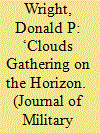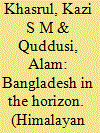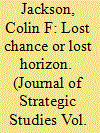| Srl | Item |
| 1 |
ID:
169387


|
|
|
|
|
| Summary/Abstract |
After the Revolution of 1905 and defeat in the Russo-Japanese War, the Russian government rebuilt its military power by modernizing weaponry, reforming mobilization plans, and expanding the standing force. As part of this effort, the Imperial Army also sought to improve the human material that was the foundation of Russia’s strength. Between 1906 and 1914, army officers introduced initiatives to prepare the population for military service. Through physical education and political lessons in the empire’s schools, as well as anniversary celebrations that glorified Russia’s past, the army hoped to create a population that would assure victory in the next war.
|
|
|
|
|
|
|
|
|
|
|
|
|
|
|
|
| 2 |
ID:
140363


|
|
|
| 3 |
ID:
095268


|
|
|
|
|
| Publication |
2010.
|
| Summary/Abstract |
This article examines three questions surrounding American attempts at war termination in 1951. Was there a militarily feasible 'lost chance' for UN forces to advance to the narrow neck of the Korean peninsula? If so, why did American decisionmakers decline to pursue it? What effect might such operations have had on the course of the war and subsequent American thinking on limited war? It concludes that the US missed a critical opportunity to conclude the war on more favorable terms; that the American decision to forgo amphibious operations in June 1951 had less to do with military calculations than with the domestic political firestorm that followed MacArthur's relief; and that the 'lost chance' not only increased the cost and duration of the Korean War, but encouraged subsequent decision makers to overstate the risks of intra-war escalation and understate the risks of premature, de-escalation.
|
|
|
|
|
|
|
|
|
|
|
|
|
|
|
|